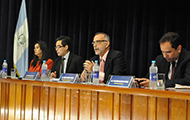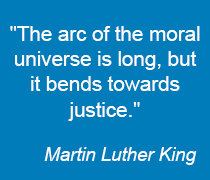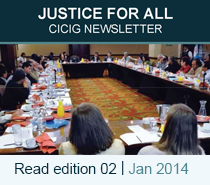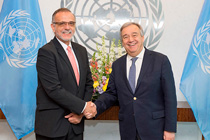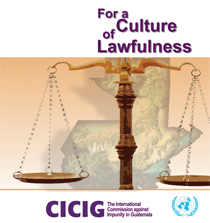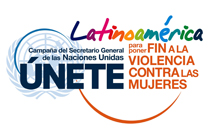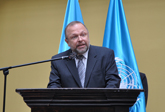 Guatemala, October 6, 2011. Francisco Javier Dall'Anese Ruiz, head of the International Commission against Impunity in Guatemala (CICIG) presented the report on the fourth year of activities, which stresses that the Commission will continue to progress in the fight against impunity, even though it may not please those sectors that have already criticized its presence in Guatemala.
Guatemala, October 6, 2011. Francisco Javier Dall'Anese Ruiz, head of the International Commission against Impunity in Guatemala (CICIG) presented the report on the fourth year of activities, which stresses that the Commission will continue to progress in the fight against impunity, even though it may not please those sectors that have already criticized its presence in Guatemala.
Government officials, representatives of the Guatemalan diplomatic corps, civil society and the national and international press descended upon the Public Prosecutor’s Office (MP) to listen to the address of the Commissioner on the four years of the Commission's activities.
The following were sat at the head table: President of the Republic Álvaro Colom Caballeros; Vice-President of the Republic Rafael Espada; Attorney General Claudia Paz y Paz; President of Congress Roberto Alejos; President of the Supreme Court of Justice Thelma Aldana; Minister of the Interior Carlos Menocal; United Nations Resident Coordinator in Guatemala René Mauricio Valdés; and Commissioner Dall'Anese Ruiz.
"No matter what, we will progress with criminal investigations to reduce impunity; no matter what, we will progress with thematic investigations to draft public policies; no matter what, we will progress with proposing laws to improve justice and transferring knowledge to the Public Prosecutor’s Office (MP) and the police; and no matter what, we will make progress with the criminal complaints related to corruption and the obstruction of justice," stressed the Commissioner.
He indicated that CICIG continues to be a multinational justice force with 207 professionals of 23 different nationalities, including Guatemalans. Being sui generis in nature, it is similar to an international prosecutor's office that is bound by a mandate and the Guatemalan legal system.
He recalled the smear campaigns that have been launched against CICIG when he has turned his attention to certain "organized crime bastions", which have strengthened rather than debilitated the Commission's efforts, because they are a sign that things are being done correctly.
"Internally at CICIG, these plots were considered and will continue to be considered to be a sign of success, because top criminals criticize an accusatorial body when things are being done well. We would have cause for concern if these same individuals were to praise us, because it would lead us to believe that we were doing something wrong," he said.
Therefore, he thanked civil society organizations for the support they showed by offering their signatures to express their backing for the Commission during the visit of United Nations Secretary-General Ban Ki‑moon to Guatemala. He also thanked the Guatemalan diplomatic corps "for the support they have always given to us, especially when we have been attacked by those who oppose the fact we prosecute criminals."
He added that the exit strategy will include thematic reports, legislative proposals and skills transfer to better coordinate the State of Guatemala such that it will be able to fight organized crime and parallel structures on its own.
Seven recommendations
The Commissioner said that he would continue to insist on creating special prosecutor's bureaus, based on the model of the Special Anti-impunity Prosecutor's Bureau (FECI); strengthening the Office of Protection of Victims and Witnesses; creating a scientific police force of criminal investigation; strengthening the Special Methods Unit, especially in relation to telephone tapping; creating a police information platform; and strengthening judicial independence through constitutional reform.
As to this final point, he said that there are bills before Congress, which have been promoted by certain universities, civil society organizations and the Constitutional Court judge, Roberto Molina Barreto.
He urged presidential candidates Otto Pérez Molina and Manuel Baldizón to take the previous actions as part of their security and justice programs, if one of them were to become President of the Republic. Furthermore, he urged them to promote the legislative package proposed by CICIG, namely the anti-corruption regulations and the Organic Law of the MP.
The Commissioner highlighted the work undertaken by the MP and the Ministry of the Interior in recent months—especially in the Cabral case and the cases concerning the murders of mayoral candidates of San José Pinula—because there is evidence of the effectiveness of knowledge transfer at the two institutions.
"Furthermore, when institutions are open to receiving support, it shows that the work of CICIG is effective; however, the Attorney General should be afforded true independence in order to develop her internal strategy and conduct our joint efforts," he added.
The Commissioner offered the services of CICIG to the recently-elected President of the Supreme Court of Justice Thelma Aldana to strengthen the transparency and zero tolerance for corruption program, which is promoted by the body.
"For now we shall continue to file administrative and criminal complaints—as we have done over recent weeks—on any irregularities or crimes we detect in the actions of judges who, as a small handful, tarnish the good image of the majority of honest judges," he stated.
As a result, he urged Congress to provide economic funds to security and justice institutions, which for months have been declaring that they would close this month if they did not receive the money needed to continue operating.
Challenges
In her address, the Attorney General Claudia Paz y Paz said the founding objectives of CICIG were to support the MP in dismantling illegal security forces and strengthening the justice sector institutions.
"Together with CICIG, we have identified, prosecuted, tried and convicted people with ties to powerful structures, such as in the Rosenberg case, the case of former President Alfonso Portillo, the extrajudicial killing of prisoners at Pavón prison and the illegal adoptions cases," she explained.
She also underlined the support provided by the Commission to justice institutions to approve various laws, such as the Law on Nominating Commissions, the Law on Asset Forfeiture and amendments to the Code of Criminal Procedure. "Skills transfer has benefited the witness protection system, because it now has protocols for the entry and exit of people, risk analysis and security measures," she manifested.
The Attorney General stressed that one of the main challenges of the judicial system is to purge its institutions: "It is necessary to purge the MP, the Judiciary and the police, because otherwise it will not be possible to sustain any of the efforts undertaken by CICIG."
Furthermore, she said that to ensure the transfer of skills by the Commission, it is necessary to have professional, honest individuals who are committed to providing prompt and fair justice for Guatemalans.
She added that another challenge is the creation of a professional, independent criminal investigation police force to strengthen the criminal investigation system. "The third challenge is to make progress with legislative changes such that the independence of institutions can be ensured; therefore, the reform of the Organic Law of the MP and the Law on the Career System in the Judiciary are crucial," she said.
Successful work
President Álvaro Colom stated that the Commission's work has broken paradigms of the past: "Thanks to CICIG it has been possible to imprison leaders of the police force; I removed two ministers from their posts; and amid the darkness cast by impunity, we began to see the light of justice."
He said the Commission's work had been a success and indicated that with its support, a transformation has been seen in the work of the MP and the Ministry of the Interior. He also valued the work of the Attorney General in investigations into crimes against humanity.
The President also emphasized that to forge ahead with these efforts, the significant challenge posed by the fiscal reform must be resolved: "As Guatemalans, we must take on the responsibility of funding justice in the country, because there is no additional money for more police, judges or prosecutors."
Therefore he said the progress of the justice sector, with the support of CICIG, must be multiplied in order to tackle the organized crime that is damaging the country. "We need to inject funds into the judicial institutions, and this will only be possible through a thorough fiscal reform and the approval of an appropriate budget for the justice, health and education sectors," he said.


